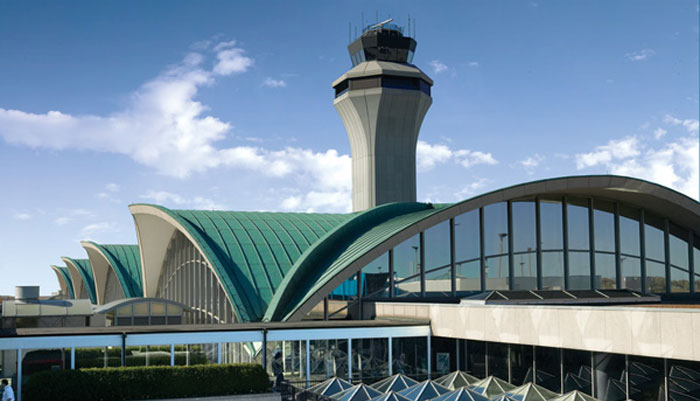
Passenger facility charges (PFCs) — paid by every flyer on every flight as part of the cost of an airline ticket — should not be increased, conservative activist and CNN political commentator Ed Martin told Transportation Today.
“It won’t be helpful” in his home state, the Missouri politico wrote Oct. 31 in an email. An attorney, Martin was elected chairman of the Missouri Republican Party in 2013. He also served as former Missouri Republican Gov. Matt Blunt’s chief of staff in 2006-2007.
“Our two major airports in St. Louis and Kansas City have been trying to grow in size and in flights for a number of years,” explained Martin. “In St. Louis, the loss of TWA — bought by American but kept as an American hub only briefly — has been very difficult and we’ve been seeking as many new flights as possible from riders and growing new carriers. Also, Kansas City has been seeking to grow the same way.”
Any PFC increase “would be bad,” he said, and would slow sales and increase costs during a time when the state needs more.
“To be clear: the increase will be detrimental to all of these efforts and seems ill-advised especially since there are lots of funds already collected that should be used before raising taxes,” he said.
The current PFC cap is $4.50 per ticket. In June, two airport groups, the American Association of Airport Executives and Airports Council International-North America, sent a joint letter to the White House asking U.S. President Donald Trump to raise the PFC cap to $8.50 per ticket.
The airports contend that a PFC cap increase would make them less dependent on the U.S. government and spur private-sector investment, suggestions they also say are “directly consistent” with Trump’s $1 trillion national infrastructure plan contained in his 2018 budget blueprint. And although Trump did not include such a PFC cap increase in his proposal, the president does support spinning off the nation’s air traffic control system from the Federal Aviation Administration (FAA) to modernize it more swiftly.
Critics of the airports’ plans — which include airlines and consumer and taxpayer groups, among others — say the airports want the federal cap increased or even removed so they are free to charge passengers whatever they deem necessary to cover their FAA-approved infrastructure improvement projects.
Nicholas E. Calio, president and CEO of Airlines for America (A4A), a trade association representing the nation’s leading airlines, for instance, recently wrote in an op-ed that “if airports want this PFC increase so badly, let them own it and collect it themselves.”
“Senate appropriators should kill the measure once and for all,” Calio wrote in an Oct. 4 contributed item to The Hill. “But if airports are so intent on reaching into flyers’ pockets, I have an idea: Let them do it in the open and in the light of day. Rather than tack this tax onto the price of an airline ticket — which is already taxed at nearly 21 percent for a typical domestic round-trip fare and the increase is hidden as part of the fare — let airports collect the tax.”
Specifically, the consequences of such a PFC increase could be significant, according to A4A, which says for every $1 increase in the PFC, airline passengers would pay an additional $800 million a year.
“And remember,” Calio wrote, “Airports are actually pushing for no cap on the tax, which would give them unadulterated freedom to add airport taxes to airline tickets.”
In Missouri, Martin speculates that such a PFC increase “would decrease ticket sales and perhaps make it less likely that other carriers move into this area.”
Everyone would like to see upgrades happen at U.S. airports and Calio thinks they already have plenty of money to do them.
However, 145 groups, including corporations, trade groups and tourism agencies, sent an Oct. 25 letter to House and Senate leaders urging that provisions in the Senate’s FY 2018 Transportation, Housing and Urban Development and Related Agencies Appropriations Act (THUD), S. 1655, be retained, particularly those allowing each airport authority to tailor its PFC rate on a project-by-project basis, while protecting rural travelers from paying higher PFCs on connecting flights.
Specifically, these travel industry groups would like to have the PFC cap adjusted to “accelerate investments in airport infrastructure that improve the passenger experience, facilitate growth in air travel, and make America’s economy more globally competitive,” they write in the letter, which is spearheaded by the U.S. Travel Association.
They go on to note that too many U.S. airports are “outdated, congested and unable to handle passenger demand” and such “problems are forecasted to grow and will soon be unsustainable.”
But increasing the PFC is not something President Donald Trump wants to do.
“The problem is, I don’t like making fees or taxes, I’ll be honest with you,” Trump said during a White House breakfast he held earlier this year with airline industry representatives.
Specifically, Trump was responding to the Tampa airport director, who suggested raising the PFC, which he called a user fee, not a U.S. tax, “that hasn’t been increased in 16 years so it’s basically defunded.”
But Trump said that because the U.S. spends trillions of dollars overseas on bad trade deals and to fight wars, “the last thing we have to do is to raise the fee.”
“I understand what you’re saying, but $4.50; it’s a lot when you look at all of the passengers — there are other ways of doing this,” Trump said.
Ultimately, said the president, such an increase would only end up hurting the very businesses that think they would benefit from raising the PFCs.
“Eventually, people will just stop flying because it gets very expensive with all the taxes,” said Trump. “I mean, there are other ways.”